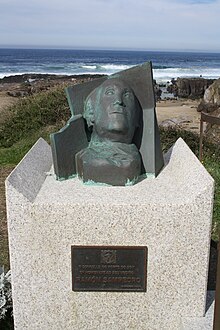Ramón Sampedro
This article includes a list of references, related reading, or external links, but its sources remain unclear because it lacks inline citations. (February 2013) |
Ramón Sampedro | |
|---|---|
 | |
| Born | Ramón Sampedro Cameán January 5, 1943 |
| Died | January 12, 1998 (aged 55) Boiro, Galicia, Spain |
| Cause of death | Assisted suicide |
| Nationality | Spanish |
| Occupation | Fisherman |
| Known for | Right-to-die case |
Ramón Sampedro Cameán (5 January 1943 – 12 January 1998) was a Spanish fisherman and writer. Sampedro became a quadriplegic at the age of 25 (23 August 1968), following a diving accident, and fought for his right to an assisted suicide for the next 29 years.
Demand for suicide
As a young man he had jumped into the sea from rocks near his home, a fishing village in the northern Spanish region of Galicia. Misjudging the water's depth, he struck his head on the bottom. He sustained a complete spinal cord injury, leaving him paralyzed from the neck down.
Sampedro tried Spain's lower courts, its higher courts, even the European Commission on Human Rights in Strasbourg to end his life. His argument hinged on the fact that he was sure of his decision to die. However, owing to his paralysis, he was physically unable to commit suicide without help. He argued that suicide was a right that he was being denied, and he sought legal advice concerning his right to receive assistance to end his life, first in the courts of Spain, where his case attracted country-wide attention. Eventually, his fight became known worldwide.
Death and aftermath
Sampedro died on Monday 12 January 1998 in Boiro, Spain, from potassium cyanide poisoning. Several days later, a close friend of Sampedro , Ramona Maneiro, was arrested and charged with assisting his suicide. Sampedro had divided the elements required to complete his suicide into individual tasks, each small enough that no single person could be convicted of assisting the suicide process entirely. Maneiro was released due to lack of evidence. No further charges were ever filed in connection with Sampedro's death.
Seven years later, after the statute of limitations had expired, Maneiro, speaking on a Spanish talk show, admitted to providing Sampedro with a cyanide-laced drink and a straw. She said "I did it for love." She also said she had turned on the video camera that recorded Sampedro 's last words before he drank the poison and that she was in the room, behind the camera.
He left an open letter to the judges and the society and caused an ethical turmoil in the Spanish society which led to a Senatorial Committee on Euthanasia in 1999.
Mar adentro
The story of Sampedro's life and death was made into a Spanish film, Mar adentro (English title: The Sea Inside) (2004), in which he was portrayed by Javier Bardem. The movie drew international attention and won the Best Foreign Language Film at the 77th Academy Awards.
He wrote a book before he died titled Cartas desde el infierno (Letters from Hell). It is in Spanish and includes a collection of poems, short essays, and reflections on life from Sampedro’s point of view.
See also
Further reading
- Sampedro, Ramón (1996). Cartas desde el infierno (in Spanish). Planeta. ISBN 84-08-05632-8.
{{cite book}}: Cite has empty unknown parameters:|month=and|chapterurl=(help); Unknown parameter|trans_title=ignored (|trans-title=suggested) (help) - Sampedro, Ramón (1998). Cando eu caia (in Galician). Edicións Xerais. ISBN 8483022605.
{{cite book}}: Cite has empty unknown parameters:|month=and|chapterurl=(help); Unknown parameter|trans_title=ignored (|trans-title=suggested) (help)
External links
- "Live and Let Die". TIME. January 26, 1998. Article by Rod Usher in TIME magazine written shortly after Sampedro's death.
- "A Suicide Tape on TV Inflames the Issue in Spain". The New York Times. March 9, 1998.
- 1943 births
- 1998 deaths
- People from Noia (comarca)
- Activists who committed suicide
- Suicides by cyanide poisoning
- Suicides in Spain
- Euthanasia activists
- Deaths by euthanasia
- Filmed suicides
- Medical ethics
- People with tetraplegia
- Spanish people with disabilities
- Poets who committed suicide
- Writers who committed suicide
- Spanish male poets
- 20th-century Spanish poets
- Male suicides
